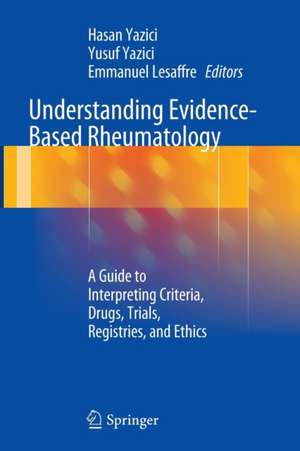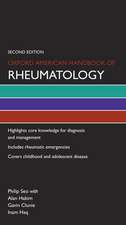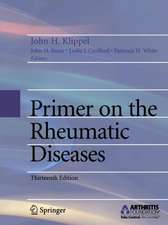Understanding Evidence-Based Rheumatology: A Guide to Interpreting Criteria, Drugs, Trials, Registries, and Ethics
Editat de Hasan Yazici, Yusuf Yazici, Emmanuel Lesaffreen Limba Engleză Paperback – 23 aug 2016
Understanding Evidence-Based Rheumatology is an invaluable resource for trainees, clinicians and scientists, preparing them with the necessary tools to correctly gather evidence and shed light on the difficult practice of rheumatology.
| Toate formatele și edițiile | Preț | Express |
|---|---|---|
| Paperback (1) | 1024.55 lei 6-8 săpt. | |
| Springer International Publishing – 23 aug 2016 | 1024.55 lei 6-8 săpt. | |
| Hardback (1) | 722.33 lei 6-8 săpt. | |
| Springer International Publishing – 10 noi 2014 | 722.33 lei 6-8 săpt. |
Preț: 1024.55 lei
Preț vechi: 1078.48 lei
-5% Nou
Puncte Express: 1537
Preț estimativ în valută:
196.11€ • 213.09$ • 164.84£
196.11€ • 213.09$ • 164.84£
Carte tipărită la comandă
Livrare economică 21 aprilie-05 mai
Preluare comenzi: 021 569.72.76
Specificații
ISBN-13: 9783319342696
ISBN-10: 331934269X
Pagini: 288
Ilustrații: XII, 276 p. 32 illus., 20 illus. in color.
Dimensiuni: 155 x 235 x 15 mm
Greutate: 0.41 kg
Ediția:Softcover reprint of the original 1st ed. 2014
Editura: Springer International Publishing
Colecția Springer
Locul publicării:Cham, Switzerland
ISBN-10: 331934269X
Pagini: 288
Ilustrații: XII, 276 p. 32 illus., 20 illus. in color.
Dimensiuni: 155 x 235 x 15 mm
Greutate: 0.41 kg
Ediția:Softcover reprint of the original 1st ed. 2014
Editura: Springer International Publishing
Colecția Springer
Locul publicării:Cham, Switzerland
Cuprins
1. Evidence in Rheumatology: How Does It Differ from Other Diseases?.- 2. A Review of Statistical Approaches for the Analysis of Data in Rheumatology.- 3. Disease Classification/Diagnosis Criteria.- 4. Biomarkers, Genetic Association and Genomic Studies.- 5. Outcome Measures in Rheumatoid Arthritis.- 6. Issues in Setting Up a Study and Data Collection.- 7. The Randomized Controlled Trial: Methodological Perspectives.- 8. Limitations of Traditional Randomized Controlled Clinical Trials in Rheumatology.- 9. Methodological Issues Relevant to Observational Studies, Registries and Administrative Health Databases in Rheumatology.- 10. Systematic Reviews and Meta-analyses in Rheumatology.- 11. Ethical Issues in Study Design and Reporting.- 12. Future Directions.
Recenzii
From the book reviews:
“This book details how to correctly use and interpret evidence-based medicine in the practice of rheumatology. … The book is written for rheumatologists, rheumatology fellows, and other physicians who take care of patients with rheumatic diseases. The authors are rheumatologists. … This book focuses on an essential topic for every physician assessing and treating patients with rheumatological disease.” (Maryam Pourpaki, Doody’s Book Reviews, January, 2015)
“This book details how to correctly use and interpret evidence-based medicine in the practice of rheumatology. … The book is written for rheumatologists, rheumatology fellows, and other physicians who take care of patients with rheumatic diseases. The authors are rheumatologists. … This book focuses on an essential topic for every physician assessing and treating patients with rheumatological disease.” (Maryam Pourpaki, Doody’s Book Reviews, January, 2015)
Notă biografică
Hasan Yazici, MD, Professor of Medicine
Istanbul University, Istanbul, Turkey
Yusuf Yazici, MD, Assistant Professor of Medicine
New York University School of Medicine, New York, NY, USA
Emmanuel Lesaffre, PhD
Department of Biostatistics, Erasmus MC, Rotterdam, the Netherlands
and
L-Biostat, K.U.Leuven
Leuven, Belgium.
Istanbul University, Istanbul, Turkey
Yusuf Yazici, MD, Assistant Professor of Medicine
New York University School of Medicine, New York, NY, USA
Emmanuel Lesaffre, PhD
Department of Biostatistics, Erasmus MC, Rotterdam, the Netherlands
and
L-Biostat, K.U.Leuven
Leuven, Belgium.
Textul de pe ultima copertă
It is imperative that health professionals caring for patients with rheumatic diseases understand how to correctly interpret evidence in their field, taking into account the merits and shortcomings of available data. Understanding Evidence-Based Rheumatology offers a practical assessment of criteria, drugs, trials, and registries and provides useful tools for successfully interpreting this data. The book introduces readers to basic analysis of trial design, statistics, and application of data through no-nonsense, easy-to-follow insights. Using numerous examples, chapters outline the difficulties physicians encounter when measuring disease activity in rheumatology, and offer strategies for systematically approaching these situations. Ethical issues in study design and reporting are examined, and the book closes with a summary of future directions for scientific and clinical studies in rheumatology.
Understanding Evidence-Based Rheumatology is an invaluable resource for trainees, experienced clinicians, and scientists, preparing them with the necessary tools to correctly gather evidence and shed light on the difficult practice of rheumatology.
Understanding Evidence-Based Rheumatology is an invaluable resource for trainees, experienced clinicians, and scientists, preparing them with the necessary tools to correctly gather evidence and shed light on the difficult practice of rheumatology.
Caracteristici
Provides useful insight to anyone needing to assess or execute any kind of clinical study Based on trials’ successes and shortcomings and shows how they affected the currently used guideline in rheumatology Offers a multifaceted approach, from interpreting data to trial design, from analysis to presentation and publication of data Includes supplementary material: sn.pub/extras












